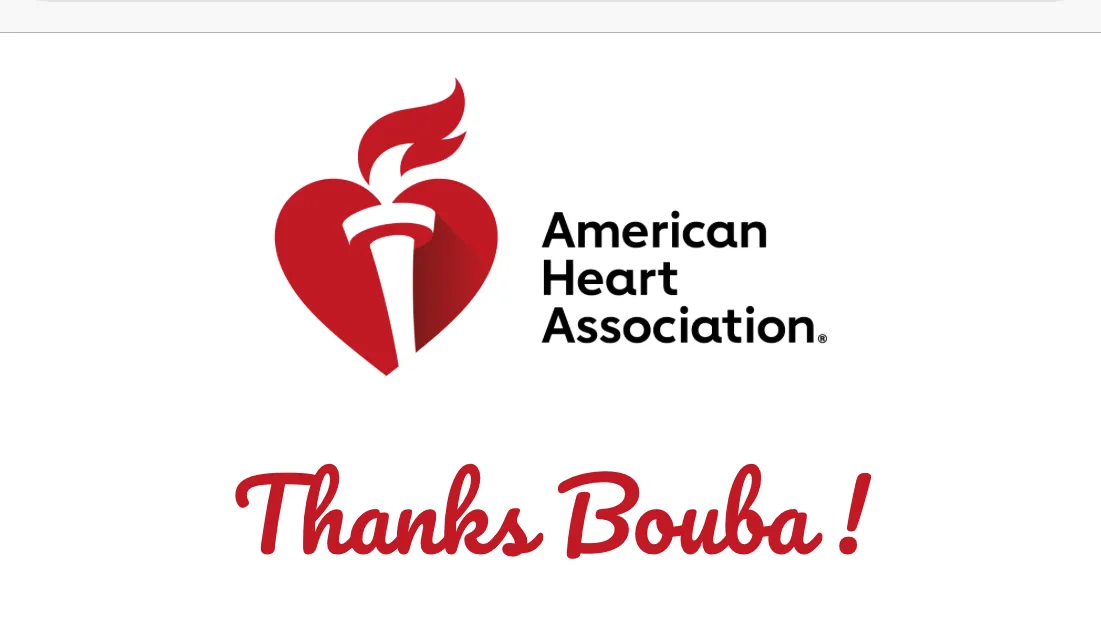HGF
Welcome Message

On the behalf of our team and myself, welcome to our Website.
Heart of a Giant Foundation (HGF) was born from my personal journey and steadfast commitment to advocacy, resilience, and positive change. Throughout my journey to receiving a heart transplant, I gained a unique insight into the challenges and intricacies of our healthcare system. This life-altering experience ignited my passion to support others navigating similar paths, a journey I understand intimately.

Meet the Founder
Meet Somaneh 'Bouba'!
Business Professional, Entrepreneur, and Heart Health Advocate
Somaneh "Bouba" Diemé is an accomplished engineer, passionate entrepreneur, and dedicated community leader committed to empowering patients, caregivers, and the broader community in heart health. As a long-time heart patient turned community health innovator, Bouba leverages his unique experiences and skills to foster connection, learning, and growth among patients and healthcare professionals.
Personal Journey and Mission:
Bouba's journey began over a decade ago when he was diagnosed with a congenital heart condition, leading to a prolonged battle with chronic heart disease and, ultimately, a life-saving heart transplant. This personal experience ignited his commitment to raising awareness, providing support, and driving positive change for those affected by heart conditions, particularly in at-risk communities.
Heart of a Giant Foundation:
As the founder of the Heart of a Giant Foundation (HGF), Bouba has led the organization to achieve significant milestones in empowering individuals at high risk of heart conditions. The foundation's programs focus on education, support, and direct intervention, helping individuals achieve self-sufficiency and improved quality of life.
Global Impact and Leadership:
Bouba is renowned for his advocacy and leadership in healthcare innovation, focusing on preventing heart diseases and improving patient outcomes. His mission to enhance local and global health is fueled by his social connections, professional knowledge, and personal experience with heart failure. By volunteering within his community and bringing a unique perspective from living in diverse parts of the world, including areas with limited resources, Bouba continues to make significant strides in raising awareness and driving positive change.
Community and Beyond:
Based in Boston, MA, with his family, Bouba's impact extends beyond his local community to his home countries of Mali and Senegal. His dedication to fostering connections and improving healthcare initiatives has made him a sought-after speaker and collaborator.
Contact Information:
For speaking engagements, collaborations, or partnership opportunities, please feel free to reach out to Bouba. Together, we can make a difference in the lives of those affected by heart conditions. Contact details can be provided upon request.
Key Achievements and Focus Areas:
- Education: Providing comprehensive heart health education to at-risk communities.
- Support: Offering resources and support networks for patients and caregivers.
- Direct Intervention: Implementing programs that directly improve the quality of life for individuals with heart conditions.
- Advocacy: Raising awareness and driving changes to enhance heart health outcomes globally.
Bouba's unwavering commitment and innovative approach inspire and empower individuals and communities worldwide.
Bouba’s Blog
Welcome to My Blog!
Welcome to My Heart Health Journey Blog
Hello, I'm Somaneh "Bouba" Diemé, a passionate advocate for heart health and the founder of the Heart of a Giant Foundation. I'm thrilled to have you join me here as I share my personal journey with heart failure and life as a heart transplant recipient.
From 2012 to 2022, I survived congestive heart failure caused by a congenital heart defect, leading to open-heart surgery to implant an LVAD (Left Ventricular Assist Device) pump. After a six-year wait, I finally received a heart transplant in late 2022. This journey has not only shaped my life but also fueled my commitment to improving patient outcomes and empowering individuals to lead healthier lives.
Through this blog, I aim to:
-Share my unfiltered experiences as a heart failure survivor and heart transplant recipient.
-Provide insights into the patient's perspective, making it more relevant to the improvement of therapies and healthcare systems.
-Empower and educate others about heart health, advocacy, and the power of community support.
-Inspire hope and resilience in those facing similar challenges.
Join the Journey.I invite you to be part of this journey, engaging with my stories, learning from my experiences, and contributing to the conversation. Together, we can drive positive change in heart health outcomes and improve the lives of patients worldwide.
Thank you for your support and for being part of this community!
New to the blog? Start by exploring some of my key posts and don't forget to subscribe to stay updated on new content.
Disclaimer: The information shared on this blog is based on my personal experiences and is not intended to replace professional medical advice. Always consult with a healthcare provider for any medical issues.

Latest Blogs

UNDERSTANDING THE LINK BETWEEN STRESS AND HEART HEALTH
Stress is an undeniable part of modern life, and its impact on our overall health, including heart health, is significant. Stress can influence cardiovascular well-being, and understanding its connection to heart health is crucial. Let’s explore the scientific mechanisms involved and provide practical tips for managing and reducing stress.
The Cortisol-Adrenaline System
When we experience stress, our body activates a mechanism called the “fight-or-flight” response. This response is meant to help us deal with challenging or dangerous situations. The main players in this system are two hormones – cortisol and adrenaline.
Cortisol is often called the “stress hormone.” Cortisol helps the body respond to stress by increasing our energy levels and sharpening our focus. It also helps regulate our blood pressure and inflammation levels. When we feel stressed, the brain sends a signal to the adrenal glands, instructing them to release cortisol into our bloodstream.
Adrenaline (aka epinephrine), is another hormone that is produced in the adrenal glands and released during stressful situations. Adrenaline helps prepare our body for immediate action. It increases the heart rate, pumps more blood to our muscles, and helps us stay alert and ready to face the stressor.


Photo by David Garrison
The Stress-Heart Health Connection
When it comes to heart health, the activation of the cortisol-adrenaline system can have both positive and negative effects. In the short term, during a stressful event, the increased levels of adrenaline and cortisol help us to respond effectively. But if we experience chronic or long-term stress, the constant activation of the cortisol-adrenaline system can have negative effects on our heart health.
High levels of cortisol and adrenaline in the bloodstream over a prolonged period can increase our blood pressure and heart rate, which can strain our heart. This can also lead to inflammation in the blood vessels, making them less flexible and more prone to damage.
Over time, these changes can contribute to the development of heart problems, such as high blood pressure, heart disease, and an increased risk of heart attacks. That’s why it’s important to manage stress effectively to minimize the long-term impact on our heart health.
Another way that stress can be damaging relates to how we choose to cope with it. Unhealthy coping behaviors often associated with stress – like smoking, excessive alcohol consumption, poor dietary choices and a sedentary lifestyle – can further contribute to heart-related issues.
So what is to be done? Fortunately there are healthy ways that we can manage and reduce stress, and protect our health in the process. The first step is to assess your stress levels. Let’s look at how.


Photo by Ivan Samkov
Ways to assess your stress levels
Here are some ways you can assess your stress levels and begin identifying what’s at the root:
1. Self-Reflection
Take some time to reflect on your thoughts, emotions, and physical sensations. Take note of any signs of stress, such as feeling overwhelmed, irritable, or anxious. Also pay attention to physical symptoms that may arise due to stress, such as headaches, fatigue, sleep disturbances, digestive problems, or changes in appetite. These can be signs that your stress levels are elevated. Journaling is a useful exercise to assist with this process. Don’t overthink it, just set aside time and make notes about physical and emotional sensations you’re experiencing. Over a few days and weeks you may start to recognize patterns and recurring themes.
2. Stress Inventory
Create a stress inventory by listing the various aspects of your life, such as work, relationships, finances, and health. Rate the level of stress you experience in each area on a scale of 1 to 10. This exercise can help you identify the specific sources of stress in your life.
3. Stress Assessment Tools
Make use of stress assessment tools or questionnaires available online or through mental health professionals. These tools often use standardized questions to measure your stress levels and provide an indication of your overall stress level.
4. Sleep Quality
Assess the quality of your sleep. If you’re experiencing difficulty falling asleep, staying asleep, or waking up feeling unrested, it may be a sign that stress is affecting your sleep patterns.
5. Social Support
Evaluate the quality and strength of your social support network. A lack of supportive relationships or feeling socially isolated can contribute to increased stress levels.
6. Productivity and Concentration
Monitor your ability to concentrate and be productive. If you find it increasingly difficult to focus on tasks or experience a decline in productivity, it could be a result of elevated stress levels.


Photo by Steven Arenas
Remember that stress levels can fluctuate, and everyone experiences and manages stress differently. If you find that your stress levels are consistently high or affecting your daily life and well-being, it’s important to seek support from a healthcare professional or mental health provider. They can help you develop effective strategies to manage and reduce stress.


News & Media
Sign-up to stay updated with the latest news, interviews, and media appearances of Somaneh “Bouba” Diemé.
Discover how Bouba makes waves in healthcare advocacy, patient support, and heart health education. Follow his journey as he shares insights, success stories, and ongoing efforts to drive positive change in healthcare systems worldwide.
Latest News

UNDERSTANDING THE LINK BETWEEN STRESS AND HEART HEALTH
Stress is an undeniable part of modern life, and its impact on our overall health, including heart health, is significant. Stress can influence cardiovascular well-being, and understanding its connection to heart health is crucial. Let’s explore the scientific mechanisms involved and provide practical tips for managing and reducing stress.
The Cortisol-Adrenaline System
When we experience stress, our body activates a mechanism called the “fight-or-flight” response. This response is meant to help us deal with challenging or dangerous situations. The main players in this system are two hormones – cortisol and adrenaline.
Cortisol is often called the “stress hormone.” Cortisol helps the body respond to stress by increasing our energy levels and sharpening our focus. It also helps regulate our blood pressure and inflammation levels. When we feel stressed, the brain sends a signal to the adrenal glands, instructing them to release cortisol into our bloodstream.
Adrenaline (aka epinephrine), is another hormone that is produced in the adrenal glands and released during stressful situations. Adrenaline helps prepare our body for immediate action. It increases the heart rate, pumps more blood to our muscles, and helps us stay alert and ready to face the stressor.


Photo by David Garrison
The Stress-Heart Health Connection
When it comes to heart health, the activation of the cortisol-adrenaline system can have both positive and negative effects. In the short term, during a stressful event, the increased levels of adrenaline and cortisol help us to respond effectively. But if we experience chronic or long-term stress, the constant activation of the cortisol-adrenaline system can have negative effects on our heart health.
High levels of cortisol and adrenaline in the bloodstream over a prolonged period can increase our blood pressure and heart rate, which can strain our heart. This can also lead to inflammation in the blood vessels, making them less flexible and more prone to damage.
Over time, these changes can contribute to the development of heart problems, such as high blood pressure, heart disease, and an increased risk of heart attacks. That’s why it’s important to manage stress effectively to minimize the long-term impact on our heart health.
Another way that stress can be damaging relates to how we choose to cope with it. Unhealthy coping behaviors often associated with stress – like smoking, excessive alcohol consumption, poor dietary choices and a sedentary lifestyle – can further contribute to heart-related issues.
So what is to be done? Fortunately there are healthy ways that we can manage and reduce stress, and protect our health in the process. The first step is to assess your stress levels. Let’s look at how.


Photo by Ivan Samkov
Ways to assess your stress levels
Here are some ways you can assess your stress levels and begin identifying what’s at the root:
1. Self-Reflection
Take some time to reflect on your thoughts, emotions, and physical sensations. Take note of any signs of stress, such as feeling overwhelmed, irritable, or anxious. Also pay attention to physical symptoms that may arise due to stress, such as headaches, fatigue, sleep disturbances, digestive problems, or changes in appetite. These can be signs that your stress levels are elevated. Journaling is a useful exercise to assist with this process. Don’t overthink it, just set aside time and make notes about physical and emotional sensations you’re experiencing. Over a few days and weeks you may start to recognize patterns and recurring themes.
2. Stress Inventory
Create a stress inventory by listing the various aspects of your life, such as work, relationships, finances, and health. Rate the level of stress you experience in each area on a scale of 1 to 10. This exercise can help you identify the specific sources of stress in your life.
3. Stress Assessment Tools
Make use of stress assessment tools or questionnaires available online or through mental health professionals. These tools often use standardized questions to measure your stress levels and provide an indication of your overall stress level.
4. Sleep Quality
Assess the quality of your sleep. If you’re experiencing difficulty falling asleep, staying asleep, or waking up feeling unrested, it may be a sign that stress is affecting your sleep patterns.
5. Social Support
Evaluate the quality and strength of your social support network. A lack of supportive relationships or feeling socially isolated can contribute to increased stress levels.
6. Productivity and Concentration
Monitor your ability to concentrate and be productive. If you find it increasingly difficult to focus on tasks or experience a decline in productivity, it could be a result of elevated stress levels.


Photo by Steven Arenas
Remember that stress levels can fluctuate, and everyone experiences and manages stress differently. If you find that your stress levels are consistently high or affecting your daily life and well-being, it’s important to seek support from a healthcare professional or mental health provider. They can help you develop effective strategies to manage and reduce stress.
The Heart of a Giant Foundation, Inc. is a 501(c)(3) nonprofit organization, EIN 84-2900386. Donations are tax-deductible.

